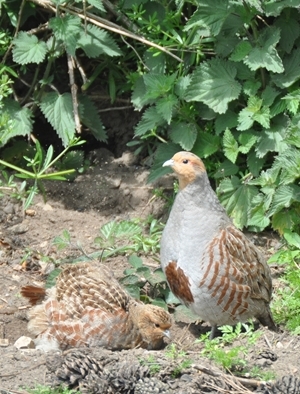 Last summer was the wettest for 100 years and wild grey partridges were one particular species that paid the price for the appalling wet conditions. Although many young partridge chicks failed to survive, recent figures released by the Game & Wildlife Conservation Trust (GWCT) showed that there is still reason to be optimistic as the over-winter survival of adult birds was much better than expected.
Last summer was the wettest for 100 years and wild grey partridges were one particular species that paid the price for the appalling wet conditions. Although many young partridge chicks failed to survive, recent figures released by the Game & Wildlife Conservation Trust (GWCT) showed that there is still reason to be optimistic as the over-winter survival of adult birds was much better than expected.
However, this red-listed species, which has suffered a drastic decline of more than 86 per cent over the past 40 years, needs a considerable amount of positive management to ensure its future survival across the country.
Henrietta Appleton, the GWCT’s regional advisor for the north of England, explained, “We run a national count scheme for grey partridges and for Northumberland, Durham and Northern Dales, we have calculated that the region has the capacity to hold at least 10,788 pairs of grey partridges. Unfortunately, because of the poor spring this year only 563 pairs of partridges were counted, whereas in the previous spring of 2012 more than 1,311 pairs of greys were recorded.”
To help raise awareness about the plight of this iconic species in the Northumberland, Durham and Northern Dales region and to encourage landowners, farmers and shoot managers to get involved in grey partridge recovery, the GWCT is holding a North East Grey Partridge Group farm walk on Thursday 3rd October at 12 noon at Melkington Farm near Cornhill on Tweed by kind permission of Mr and Mrs Ronald Barber.
This inspiring event, which is being held jointly with the Campaign for the Farmed Environment, will show how the provision of year-round habitats, together with other important management is the key to ensuring the future of this once common farmland bird.
Good quality habitat is achieved through adopting good practice. This includes ensuring good seed bed preparation, appropriate seed and crop choice and accurate insecticide applications to the commercial “in-field” crop. The event will demonstrate these aspects of establishment with input from the farm contractor and seed supplier and Alison Clayton from the CFE will provide guidance on accurate insecticide application to reduce impacts on conservation margins (NRoSo points applied for).
The farm is a shining local example of how a range of year-round habitat measures can make a difference to grey partridges. Mr Barber is passionate about building up his partridge population and as a result has provided a network of wildlife habitats such as conservation margins, wild bird seed mixes and over-winter stubbles. These not only help partridges, they are also beneficial for lapwing, skylark and tree sparrows. Habitat provision is supported by supplementary feeding and predator management to maximise breeding success and reduce losses during nesting and brood rearing.
Henrietta Appleton said, “This is a wonderful opportunity to see the art of the possible and we would like to showcase all the hard work that Mr Barber has initiated on his farm for the benefit of his greys. Partridges need all the help that they can get and we are hoping that many local farmers and game managers will attend the event and be inspired by what they see on Melkington farm. We will also be offering lots of topical tips that people can take away with them to kick-start a recovery in the north east. With the right management, wild grey partridges can bounce back really quickly.”
The event, kindly sponsored by GSC Grays, will cost £15 per person to include VAT and some light, warming refreshment. To book a place, please contact Lynda Ferguson by email: advisory@gwct.org.uk or telephone: 01425 651013 or visit our website www.gwct.org.uk/courses
END
Photocaption: Following a dismal year, the GWCT grey partridge count scheme recorded only 563 pairs for Northumberland, Durham and the Northern Dales.
Notes to editors
The Game & Wildlife Conservation Trust – providing research-led conservation for a thriving countryside. The GWCT is an independent wildlife conservation charity which has carried out scientific research into Britain’s game and wildlife since the 1930s. We advise farmers and landowners on improving wildlife habitats. We employ 22 post-doctoral scientists and 50 other research staff with expertise in areas such as birds, insects, mammals, farming, fish and statistics. We undertake our own research as well as projects funded by contract and grant-aid from Government and private bodies. The Trust is also responsible for a number of Government Biodiversity Action Plan species and is lead partner for grey partridge and joint lead partner for brown hare and black grouse.
For information, contact:
Eleanor Williams
Telephone: 07592 025476
Email: press@gwct.org.uk